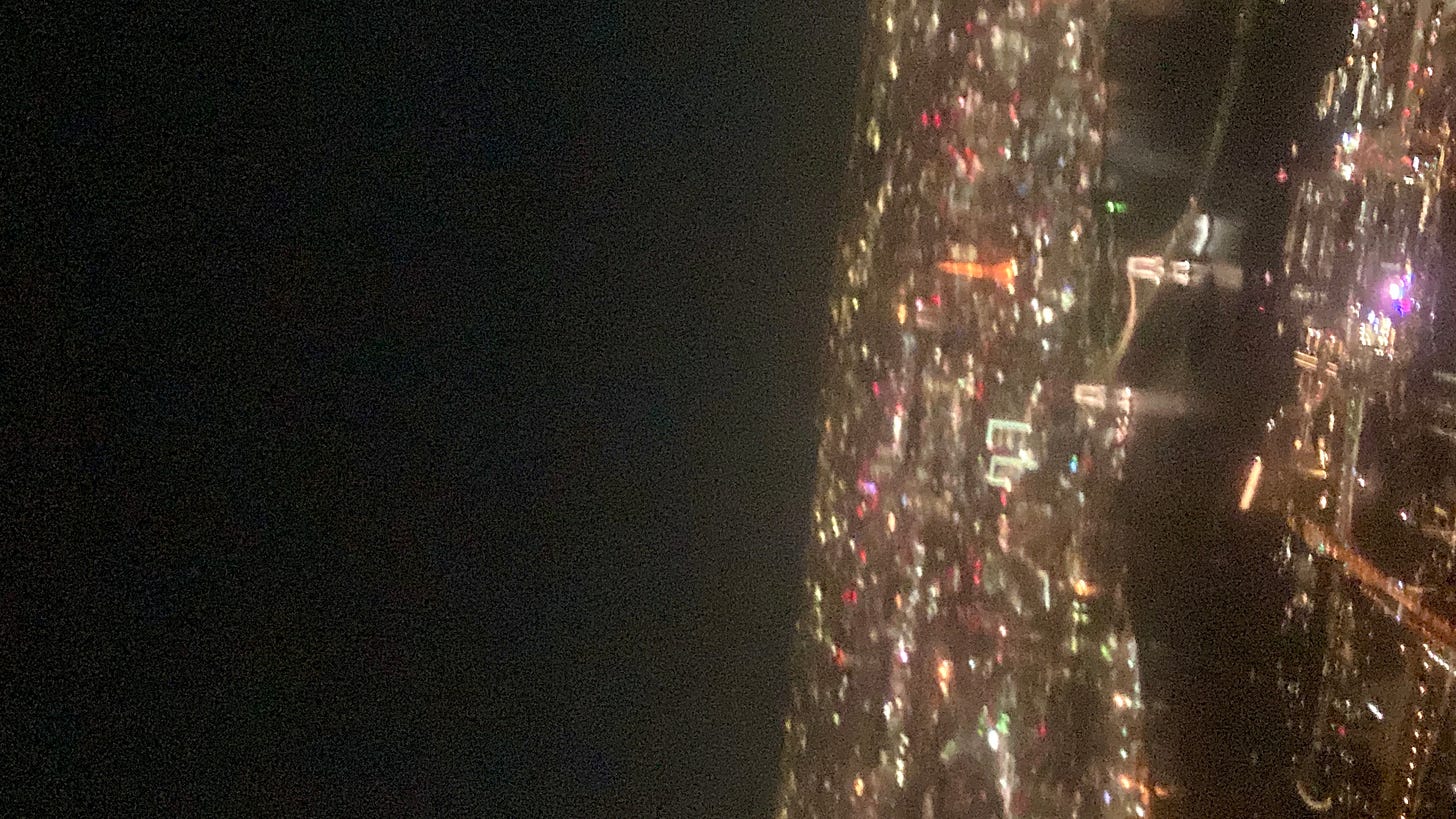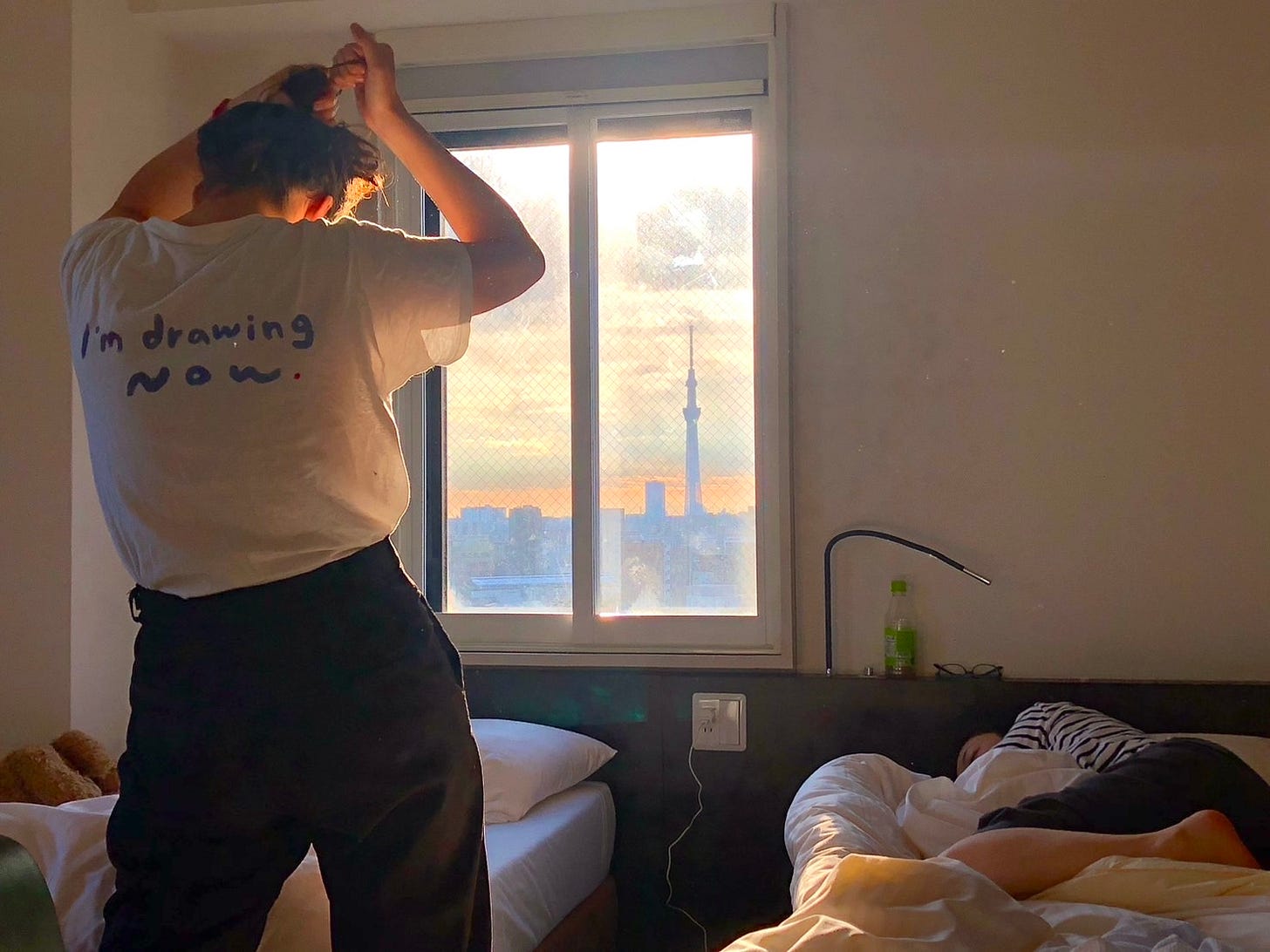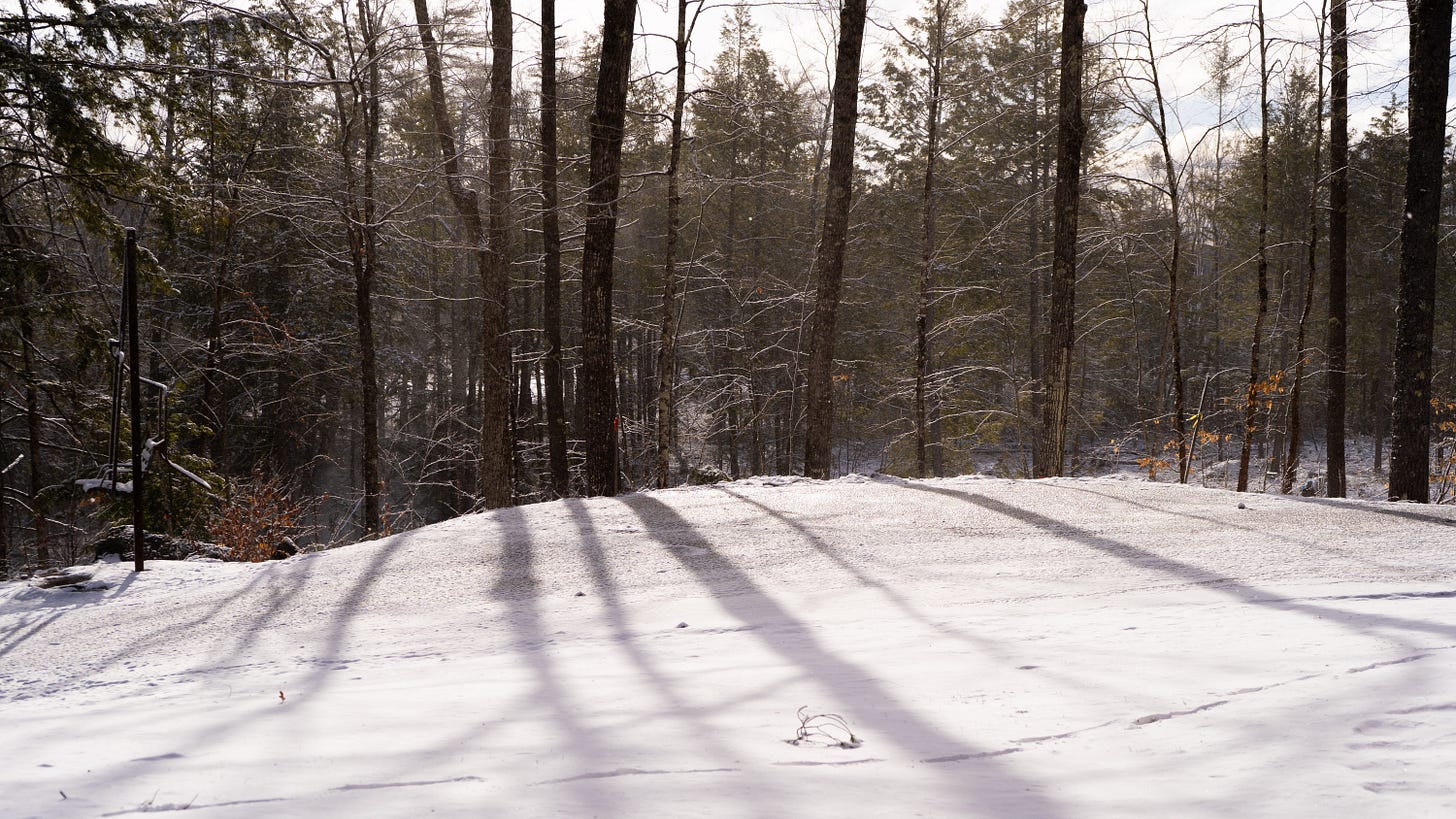Far from when? A distant, intimate friend
Tokyo to New Hampshire
On the plane. The window is next to/behind me—at my shoulder—so I have to turn my head to look out. I’m glad there’s a window.
I thought of my room just now—the window and the balcony—and some kind of pang happened in my chest—clutched it/squeezed it.
I feel many things, one of them is relief. The feeling of being so visible, too visible, and yet having parts read invisible will be gone soon. With new iterations to replace them.
There are always planes flying overhead, from the balcony. Now I am on one of them. I wonder if I’ll be one of the closer planes baring their loud, full bellies, or one of the distant ones that are just shy of being specs, confused for satellites or stars or someone else.
We just turned left on the runway and saw the familiar landscape. Tokyo twinkling in yellow, and orange. Why doesn’t it feel normal? Why are the buildings unfamiliar? We are still on the same level as one another, I haven’t left.
Just saw Tokyo Tower from above, the Rainbow Bridge in Odaiba, the Sky Tree…We’re moving further away into the dark (new), away from the lights. Arcing away and towards, like circles do. I don’t know why, but inside my head I am screaming. I pretend the engine is my voice so I can remain silent.
[ Above notes written in my journal on February 8th, 2024 while in transit from Tokyo to Toronto to Boston. They have been edited, expanded, and condensed, for Swallow. ]
Tokyo
“I feel I’m leaving a part of myself behind,” I said to Kana at the airport, when things were steadily becoming more clear, when things were signaling, at last, that they were about to rest open. Maybe into something more legible. One has to carry one’s leftover life in bags across a city. On trains, getting closer to the end of moving horizontally—one must move vertically soon. The things in my suitcases had meaning when I packed them. Everything was quite blurry then, is still blurry now, moments of sharpness grant relief. I couldn’t think well, speak well before I left.
Seven days before leaving, I didn’t know I was going to leave. Much was hanging on the decision of someone else, a higher power. I had placed it there, Precarious. I didn’t know there would be one more exhibition to do, and that I’d come to believe so wholly in its title: Everything must go / 節目. Yes, yes, yes, must go. This is where the vase fell. I hold what has been, hold it after it ends, with dwindling saturation—humming wet. Without answer. And then with Kana, after checking my suitcase with the airline, I started to disorient; leaning on her shoulder, and linking her elbow with mine. A gesture not readily practiced in our eight years, except in our language of dance. We were slumped in chairs, we would stay there for thirty minutes, holding as much as one can hold of friends who are about to go. She said seriously, “I don’t say goodbye on principle.” I nodded. Chin Up and Down. I arrived at the time I left. The forecast has extended / remained the same. Did I lose the future?
New Hampshire
Maybe I know how to be here. Not here as in The United States of Here, not in what that idea means. I mean in the familiar silence of these trees that never belonged to me, the ones I was a child with, winding up the long driveway, in a house just barely tucked out of sight. I no longer have a driver’s license, and I have habits I didn’t have before, like coffee and holding a phone. The tired I have isn’t that now day is night, and night is day. The tired is all that’s happened now that I am still.
I unzipped my suitcases on the first night home. An earring was missing, and I feel sorry; I hope it has a place to be. The things inside my suitcases don’t have the memory I thought they would. Though they do. When I close my eyes I can see my neighborhood in Tokyo so vividly it hurts. One night I cry hard about my blanket I didn’t bring. It’s just a blanket, and isn’t this nothing?—that the smells are wrong. At night, possibility reigns bare and wrong. These blankets aren’t my blankets, this isn’t where I’ve been or where I am, and I don’t know how else to say what that “is like.”
I put my lips to my saxophone for the first time in years. All my sounds bellowed, finally held in something else outside myself. Transferred into a different container. Doesn’t have to be so pretty. Sound is smoother than I thought it would be when given a place to go. The reed tastes like wood, resists, holds. Yellow-gold metal \ curved bell shape. Old friend.
For eleven consecutive nights, and still some nights after, I dream of being in Tokyo. I am restless in these dreams because they are days I’ve already lived; flitting from one place to another, throwing things away I love, hanging the paintings in the gallery so they can find homes outside of my haste. I make new holes in the purple gallery walls, and feel guilty. I am not able to tell everyone about leaving. I dash across railroad crossings just before the trains come, bells ringing. I walk the streets in search of a place I don’t know. I find the places I do know, run towards them, pulling my family across the railroad tracks with me by hand. I see tomare1 written on the pavement in white paint. Stop. In every dream there is a crushing time limit, a rush—a pressing obligation on all four sides to keep something from spilling out. To put everything inside a box.
Twice I’ve woken up at 2am and seen the outlines of my Tokyo bedroom. I caught myself reaching for the window that used to be on my left—it was cold and would wake the fingertips of someone halfway there. But now I’m “here,” and to my left now there is a wall.
In the early afternoons, which have become my first real waking moments, I orient myself by sitting at the desk—my brother’s desk—and face the window. It’s a different view. Trees and snow. There are Pines, Birches, a lone Cedar, rocks, and the gentle slope of the hill sighing upwards and away. This is my brother’s room, mine has yet to be emptied. Mine is filled with things my parents didn't know what to do with.
Tokyo
On my way to Gallery Paradiso2, my right boot, which was recently repaired by a cobbler in Yoyogi, unglued itself from the bottom of its sole. Only the toes remained attached. I was too far away from home to go back and change into my sneakers (very worn, with holes in the heels), so I limped rather hysterically and noisily the rest of the way to the gallery—the sole of the boot slapping against its counterpart with each step. I stopped at a convenient store and bought glue, it wasn’t the right kind.
Once at Paradiso, Ippei took one look at me and sighed. Miho and I agreed it was the kind of warm sigh fathers make when they are disappointed in their children who buy the wrong glue. He left the gallery with his lips pressed together, mumbling, and came back with proper shoe-glue, and red string. After gluing the boot back to itself, he tied the red string several times around its heart-center so it would hold. It did. After the glue dried, I tied the string around my wrist.
That night was my last night at Paradiso. The next morning I woke up to a room that didn’t make sense, and a red string still tied to my left wrist.
New Hampshire
I accompanied my father to my grandfather’s old house, which is now rented out to tenants. This one was leaving. I haven’t been home in five years, but it’s been even longer since I’ve been inside Grandad’s old house. When I walked inside, I noticed all the rooms still smelled like him, even though they probably didn’t. The walls were bare, and recently re-painted in egg-shell white. I thought of the blotches of color on my walls in Tokyo. The hours spent sitting, or standing next to them. I walked into Grandad’s empty living room and remembered what it used to look like when filled. Piles and piles of books, VHS’s, and newspapers; maybe two armchairs that faced the fireplace. My dad says there were no armchairs, but a red couch that faced the TV, and the window.
I left the room, exploring, went outside expecting to hear more sounds—I used to think my grandfather lived in a busier area than us. A more city-like place that granted him more knowledge and access to the world. But there was nothing outside his house except for the sound of two chickadees. I touched the pine needles on the ground. They were frozen in place. A car passed by and I realized my reason for thinking the city was here with him, he was closer to the road than we were—his house was. That was all.
Tokyo
Red paint peeled off the brush and fell onto the painting. I left it there. The brush was old and the wood was cracking. The sun was orange-yellow and setting soon; a cold breeze swept over the fields of grass, kissing the trees and turning the leaves over onto their unseen sides. An announcement rang out, telling us—the people sitting in the grass—that we would have to leave soon. Purples. Blues. Greens. More dried red fell from the brush onto the wet canvas. The gates to the park open at sunrise, close at sunset \ the gates close early in the winter month of January. I don’t remember leaving. I remember that I came because my mind was splitting, and this was the only way through.
One month later, two young women walked into Gallery Paradiso for my solo exhibition of Everything must go / 節目3. One of them kept looking at the painting with the fallen red paint from the brush. I was across the room with someone else when I noticed. The young woman stood near it but not in front of it, as if hesitant of being too close. I joined her. She told me she kept coming back to this one for some reason. 「なんでわからないけど4。」She said. I told her it was painted in an oasis of a place, at a difficult time. It felt right to tell her this, though I wasn’t sure why there was a certain ease to say so. I made this at Meiji Jingu Kōen, sitting in the grass. She gasped, covering her mouth with one hand, reaching for her friend’s arm with the other, as if to fold her into the story too. They both began to cry.
The young woman bought the painting. She told me that she and her friend had come upon Gallery Paradiso by chance that day, their afternoon was not planned but marked by meanderings. Their morning, however, had been planned. Before coming to Paradiso, they spent their morning in Meiji Jingu Kōen, sitting in the grass, talking and crying. “It had been a difficult year.”
New Hampshire
Clock surgery a week ago. (daylight savings)
Spoke with Ahmed yesterday, he says he is not a poet.
There are still people to write back to, sometimes this overwhelms me.
Bean (the family dog) finds sunlight to lie in.
Today, I will get a haircut.
Read To Be in A Time of War by Etel Adnan again.
There are some people one cannot talk to.
When night comes, the quiet is becoming more like a blanket I know, one to pull closer and there is an owl outside my brother’s window.
Tokyo
I left my apartment carrying two suitcases, a backpack, a camera bag, and a grey dolphin tucked into my jacket. I was about one block away when my boot came undone once more, peeling itself from its sole. I rolled my luggage off the main road, and turned left down a small road to see if my boot was salvageable. This happened to be where I had left my ukulele propped up against someone’s fence just hours before. I was in too much of a rush to feel anything when I saw it sitting there.
For the last two years or so, my neighborhood in Tokyo was subject to a curious mischief. Someone—I don’t know who—left toys and other objects here and there for days at a time. I photographed almost every scene I discovered, documenting the riddle, though I did get weary of doing so towards the end of my time there. The toys were repeatedly showing up in the same places I walked, and at least twice I saw someone standing near the toys that were left on my apartment building. Both times this person hurried away as I approached. Like any long-term and trodden detective, one begins to have strange thoughts, like who is following who? And If I stop taking photos, would the toys stop appearing?
The boot was not salvageable. I had already left the apartment for good, and my other shoes—the worn sneakers with holes in the heels—were in the trash. There was little choice but to turn around, return to the empty apartment, retrieve the sneakers, and throw away the boots. So, I did. I said goodbye to my room once more, though I couldn’t really feel the whole of it. The thin slice of rectangle that was mine and never mine for seven years was out of sight. Once outside, I walked by the mini piano I left on the red mailbox, where a stuffed toy turtle would occasionally appear and disappear; I saw the silhouette of my ukulele again, where I once found a miniature xylophone. These were some of my contributions to the neighborhood mischief, recognition of the outdoor museum of things that come and go without author; a final way to participate in something I largely witnessed by myself. I didn’t take pictures. I waited by the road beneath the roaring highway with my luggage. The red string still wrapped around my wrist, neither of us could keep my foot with its soul. I was two hours late to a dinner I wouldn’t be able to make. A taxi came.
Far from when? A distant, intimate friend
:
Help dear Hanin Siam’s family evacuate from Gaza : ハニンの家族を避難させて
To Be in A Time of War by Etel Adnan
Rear Window Palestine by Lamia Abukhadra via Beirut Art Center : “and what do we, the gazers, do in today’s context as the crime of genocide is committed in Gaza in full view of the world and with total impunity.”
tomare 止まれ とまれ stop
Gallery Paradiso is an art gallery, and community space in Yoyogi-Uehara, Tokyo, owned & directed by Miho Imai and managed by Ippei Hamada.
Everything must go \ 節目 was the title of my solo exhibition in Tokyo that took place just before moving back home to New England. The five day exhibition at Gallery Paradiso was organized and established in less than two days with support from Miho Imai and Ippei Hamada. The returns made from Everything must go \ 節目 helped cover my travel home.
節目 ふしめ fushime means turning point, or juncture. Miho described it to me as the layers of bamboo, middle/center points, where one shoot grows from the other.
English translation of なんでわからないけど: I don’t know why.





This is a really wonderful piece, Jes! You captured your feelings so well. I can imagine the adjustment feels heavy- especially since it was so sudden. Time, and how it shapes us, is a crazy thing. Welcome back to NH!
You may have left Tokyo, but you certainly did not leave behind your creativity!!! I love how you alternate between your situations in Japan and NH. Each segment is a beautiful, complete piece on its own. Thank you for allowing us to continue to follow your remarkable journey!